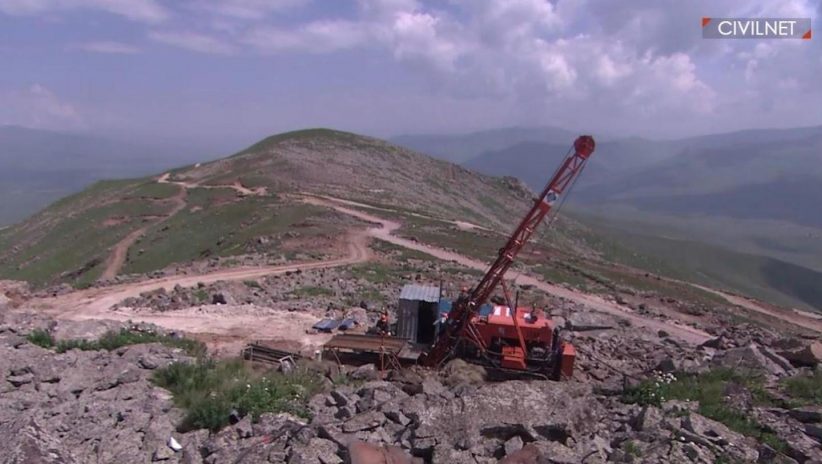By Ani Paitjan
On August 19, Armenia’s Prime Minister Nikol Pashinyan gave the green light for the controversial Amulsar Gold Mine project to commence. Pashinyan’s decision has resulted in heated debate and protests throughout the country.
The mine is operated by Lydian International. The company is officially registered in Jersey, Channel Islands. The island is known as one of the leading offshore financial centers.
“At this moment the mine should be exploited. Amulsar will be operating with high environmental standards, unprecedented for Armenia,” Pashinyan stated in a Facebook live video.
The decision came following the release of the Environmental Impact Assessment (EIA) report on August 14 drafted by the Beirut-based environmental and water management consultancy group Earth Link and Advanced Resources Development (ELARD).
According to the firm’s findings, the mine poses no risk to Lake Sevan or to its neighbouring spa town of Jermuk.
The long-contested mine, located in Vayots Dzor province, had halted construction for over a year, starting in 2018, because of a blockade by local residents and environmental activists who oppose the mine on environmental and economic grounds.
During a session of Armenia’s parliament on August 15, Hayk Grigoryan, Chair of the Investigative Committee, said that the government’s conditions for authorizing the mining process were positive. The Committee had previously investigated a criminal case against government officials who were accused of withholding information about possible pollution coming from the mine.
Grigoryan noted that the mine would not endanger Jermuk’s hot springs, a major tourist attraction. He added that the risk to Lake Sevan was also insubstantial. Further, while mine run-off could possibly harm the Arpa, Vorotan and Darb rivers, Grigoryan said there were mitigation measures that Lydian could take to make the risk ‘manageable’.
However, the government Investigative Committee’s report also highlights some negative aspects in the mitigation measures.
“A number of the measures and plans, are partial, not-sufficiently protective, and/or unreliable with a high degree of uncertainty, particularly due to deficient and questionable data, models, model simulations, design bases, and/or assessment,” it reads.
The open-pit mine is located near the catchment basins of Arpa, Vorotan and Darb rivers, which sustain agriculture in the Vayots Dzor Province. It is also situated above the Arpa-Vorotan tunnel, which connects the River Kechut (through the Kechut Reservoir) to Lake Sevan, Armenia’s largest source of freshwater.
Amulsar has been in controversy since the Anglo-Canadian mining consortium Lydian International LTD started to extract gold deposits from the site in Armenia’s Vayots Dzor province in 2012. Environmental activists stress that toxic discharge from the mine would endanger all of these resources.
Pashinyan’s confirmation for the mining exploitation angered hundreds of environmental activists who, after the announcement, protested against the decision and blocked the entrance to the parliament building, demanding the government stop the mine exploitation.
“I read the report and you do not need to be an expert to understand that the conclusions of the report show many failures and blurry points. And in this context, it is not possible to let Lydian reopen the mine,” said activist Rima Sargsyan.
Many Jermuk residents say they are opposed to the operation because of the consequences on the environment and on tourism, which is a key sector for the spa town.
“Our town is founded on the healthy benefits of our water sources. That is why people come to Jermuk. If they know that there is an open-pit mine near our town, they will not come. It is nonsense. If in the end, the government restarts the mining process, we will fight against this decision,” said a local resort owner.
Arpine Galfayan, an environmental activist from the Armenian Environmental Front, says she is opposed to mining in general.
“Even in countries where mining is conducted with high standards, such as Canada, Australia, Sweden, etc., there is no example of mining that did not cause danger, that did not lead to pollution of the exploited areas,” she told CivilNet.
Examples from the past, such as the bankrupt Teghut open-pit mine that led to the destruction of hectares of forests and health complications, showed the inability of the government to regulate mining operations.
Background:
The decision also divides members of Pashinyan’s My Step party.
On his Facebook page, Member of the Parliament Mikael Zolyan wrote that the report’s conclusions do not provide a basis for the claim that the risks are manageable.
“In short, until they persuade me, I am against the operation of the mine,” he wrote.
Other political parties also raised concerns.
The Armenian Revolutionary Party called the Investigative Committee’s competence into question.
The Citizen’s Decision party stated that the claim that risks can be managed are not credible, and “the whole study is full of contradictions and may lead to manipulation.”
















